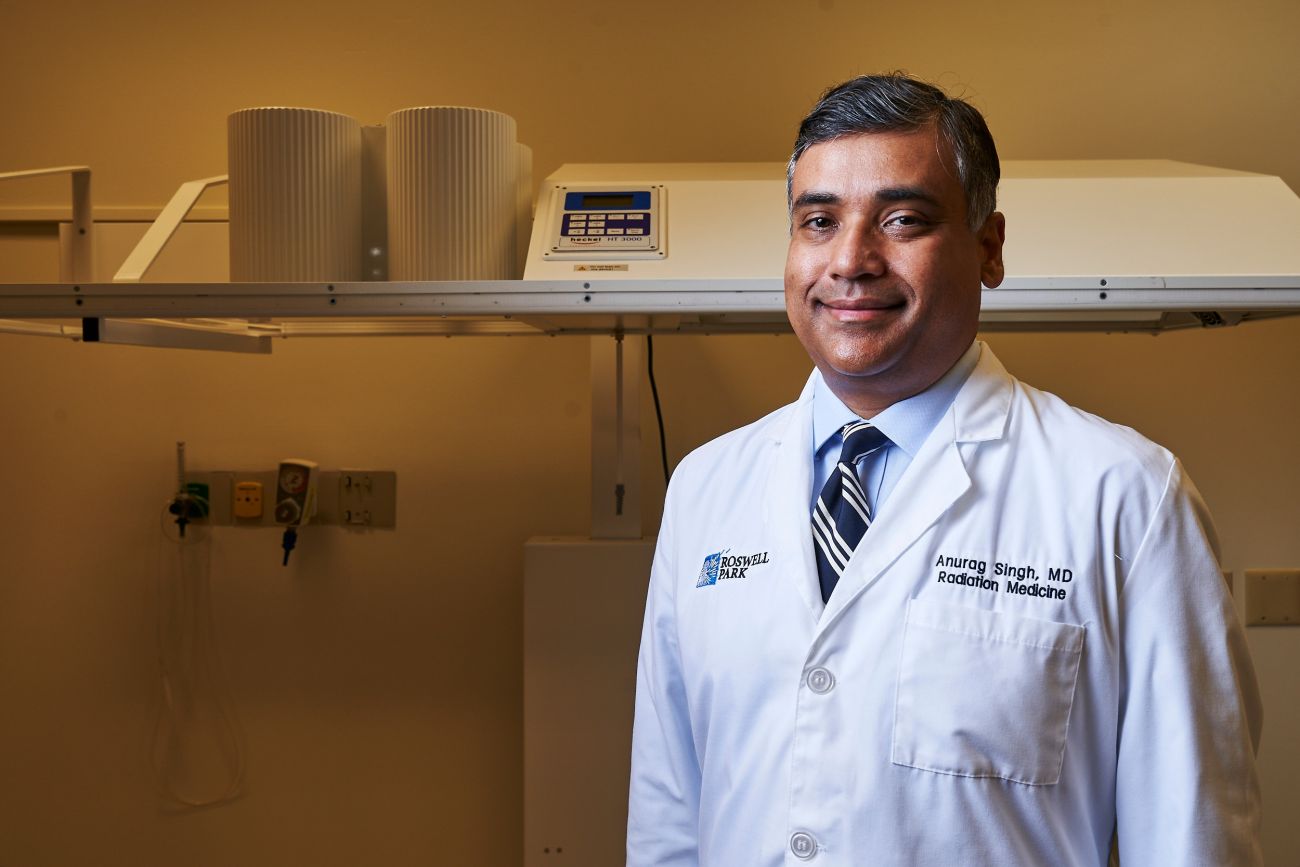Dr. Anurag Singh proposed single-dose radiation for many cancer patients, and use of nonopioid to manage mucositis
- High-dose radiation for lung cancer is safe and effective, Dr. Singh showed
- He proposed alternatives to narcotics for patients suffering from mouth sores
- Both practices now included in cancer-care guidelines from influential groups
BUFFALO, N.Y. — Physician researchers work hard to improve their patients’ lives through better treatments and greater attention to factors that can improve quality of life. Sometimes, their efforts can influence the care of not just their own patients, but of people across the country and even internationally.
Two care strategies championed by Roswell Park Comprehensive Cancer Center radiation oncologist Anurag Singh, MD, have been adopted as recommendations in major healthcare guidelines.
Dr. Singh led the first prospective clinical trial to demonstrate that some patients with lung cancer can be treated as effectively with a single, high-dose treatment, or fraction, of radiation therapy as they can with the standard course of three separate treatments. This one-dose strategy, which has also been shown to benefit many patients with kidney cancer, reduces patients’ overall exposure to radiation and can be less taxing for patients and their caregivers.
He’s so strongly associated with the approach, he made it his Twitter handle: @Single_Fx_Singh, short for “Single-fraction Singh.”
Dr. Singh, who is Professor of Oncology and Director of Radiation Research at Roswell Park, also led the team that showed last year that patients who experience mucositis, or painful mouth sores, following treatment for head/neck cancers can have their pain controlled just as effectively with gabapentin, a drug widely used to prevent seizures, as with opioids or other potentially addictive narcotics — the first prospective study to compare these approaches.
Several recent treatment guides have incorporated these two practices into their recommendations:
- Prophylactic gabapentin to manage mucositis: The National Comprehensive Cancer Network® (NCCN®) has adopted a recommendation for reducing mucositis pain with gabapentin as part of the NCCN Clinical Practice Guidelines in Oncology (NCCN Guidelines®) for Head and Neck Cancers (version 2.2020). The NCCN Guidelines cite the Roswell Park team’s 2019 study showing that gabapentin given before symptoms arose decreased the need for narcotics in patients undergoing treatment for head/neck cancers sixfold — from 6% to 42% — as one of the pieces of evidence supporting the recommendation.
- Single-fraction radiation for lung cancer: Three new treatment guidelines and a review article specifically cite work by Dr. Singh and colleagues in recommending “hypofractionated” radiation given in a single treatment for many patients receiving stereotactic ablative body radiotherapy, known as SBRT or SABR, as treatment for lung cancer — publications specifically responding to the challenges of providing cancer treatment during the COVID-19 pandemic. “Local control rate, progression-free survival (PFS) and overall survival, as well as late toxicity and quality of life, were comparable between single-fraction and multi-fraction SABR regimens,” note the guidelines published Aug. 1 in Clinical Oncology.
The other journals that cited work by Dr. Singh as they outline recommendations for single-fraction radiation therapy for lung cancer are Advances in Radiation Oncology, the International Journal of Radiation Oncology, Biology, Physics and the World Journal of Clinical Oncology.
Additionally, a preference for single-fraction SBRT is noted in the recommendations within a consensus statement from the European Society for Radiotherapy and Oncology (ESTRO) and the American Society for Radiation Oncology (ASTRO) on management of patients with lung cancer during COVID-19.
“We’re always looking at ways to improve our patients’ clinical outcomes — how effective their treatment is in controlling their disease and how we can help them to get back to health and back to their normal activities as quickly as possible. When we can achieve these goals with less treatment, less inconvenience and fewer complications or risks,” says Dr. Singh, “that is about as rewarding as medical practice can be.”
###
Roswell Park Comprehensive Cancer Center is a community united by the drive to eliminate cancer’s grip on humanity by unlocking its secrets through personalized approaches and unleashing the healing power of hope. Founded by Dr. Roswell Park in 1898, it is the only National Cancer Institute-designated comprehensive cancer center in Upstate New York. Learn more at www.roswellpark.org, or contact us at 1-800-ROSWELL (1-800-767-9355) or ASKRoswell@RoswellPark.org.
Annie Deck-Miller, Senior Media Relations Manager
716-845-8593; annie.deck-miller@roswellpark.org
